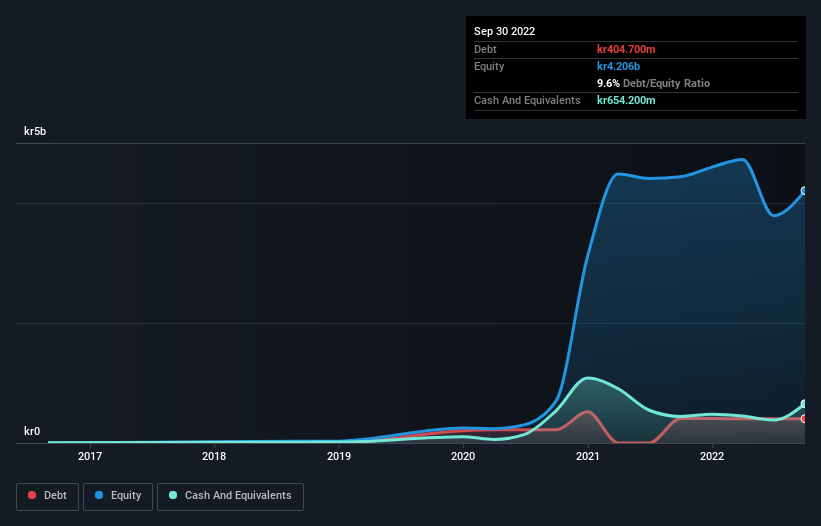Warren Buffett famously said, 'Volatility is far from synonymous with risk.' So it might be obvious that you need to consider debt, when you think about how risky any given stock is, because too much debt can sink a company. We can see that Enad Global 7 AB (publ) (STO:EG7) does use debt in its business. But is this debt a concern to shareholders?
Why Does Debt Bring Risk?
Debt assists a business until the business has trouble paying it off, either with new capital or with free cash flow. Ultimately, if the company can't fulfill its legal obligations to repay debt, shareholders could walk away with nothing. However, a more usual (but still expensive) situation is where a company must dilute shareholders at a cheap share price simply to get debt under control. Of course, plenty of companies use debt to fund growth, without any negative consequences. When we think about a company's use of debt, we first look at cash and debt together.
Check out our latest analysis for Enad Global 7
How Much Debt Does Enad Global 7 Carry?
As you can see below, Enad Global 7 had kr404.7m of debt, at September 2022, which is about the same as the year before. You can click the chart for greater detail. However, it does have kr654.2m in cash offsetting this, leading to net cash of kr249.5m.

A Look At Enad Global 7's Liabilities
According to the last reported balance sheet, Enad Global 7 had liabilities of kr592.4m due within 12 months, and liabilities of kr745.7m due beyond 12 months. On the other hand, it had cash of kr654.2m and kr337.0m worth of receivables due within a year. So it has liabilities totalling kr346.9m more than its cash and near-term receivables, combined.
Since publicly traded Enad Global 7 shares are worth a total of kr2.65b, it seems unlikely that this level of liabilities would be a major threat. However, we do think it is worth keeping an eye on its balance sheet strength, as it may change over time. While it does have liabilities worth noting, Enad Global 7 also has more cash than debt, so we're pretty confident it can manage its debt safely. When analysing debt levels, the balance sheet is the obvious place to start. But it is future earnings, more than anything, that will determine Enad Global 7's ability to maintain a healthy balance sheet going forward. So if you want to see what the professionals think, you might find this free report on analyst profit forecasts to be interesting.
In the last year Enad Global 7 wasn't profitable at an EBIT level, but managed to grow its revenue by 86%, to kr2.2b. Shareholders probably have their fingers crossed that it can grow its way to profits.
So How Risky Is Enad Global 7?
While Enad Global 7 lost money on an earnings before interest and tax (EBIT) level, it actually generated positive free cash flow kr105m. So although it is loss-making, it doesn't seem to have too much near-term balance sheet risk, keeping in mind the net cash. One positive is that Enad Global 7 is growing revenue apace, which makes it easier to sell a growth story and raise capital if need be. But that doesn't change our opinion that the stock is risky. When I consider a company to be a bit risky, I think it is responsible to check out whether insiders have been reporting any share sales. Luckily, you can click here ito see our graphic depicting Enad Global 7 insider transactions.
At the end of the day, it's often better to focus on companies that are free from net debt. You can access our special list of such companies (all with a track record of profit growth). It's free.
Valuation is complex, but we're here to simplify it.
Discover if Enad Global 7 might be undervalued or overvalued with our detailed analysis, featuring fair value estimates, potential risks, dividends, insider trades, and its financial condition.
Access Free AnalysisHave feedback on this article? Concerned about the content? Get in touch with us directly. Alternatively, email editorial-team (at) simplywallst.com.
This article by Simply Wall St is general in nature. We provide commentary based on historical data and analyst forecasts only using an unbiased methodology and our articles are not intended to be financial advice. It does not constitute a recommendation to buy or sell any stock, and does not take account of your objectives, or your financial situation. We aim to bring you long-term focused analysis driven by fundamental data. Note that our analysis may not factor in the latest price-sensitive company announcements or qualitative material. Simply Wall St has no position in any stocks mentioned.
About OM:EG7
Enad Global 7
Develops, publishes, markets, and distributes games in PC, console, and mobile platforms in Sweden, rest of Europe, North America, South America, Asia, Africa, and the Oceania.
Reasonable growth potential and fair value.
Similar Companies
Market Insights
Community Narratives


Recently Updated Narratives


Fiducian: Compliance Clouds or Value Opportunity?


Q3 Outlook modestly optimistic


Alphabet: The Under-appreciated Compounder Hiding in Plain Sight
Popular Narratives


The company that turned a verb into a global necessity and basically runs the modern internet, digital ads, smartphones, maps, and AI.


MicroVision will explode future revenue by 380.37% with a vision towards success



